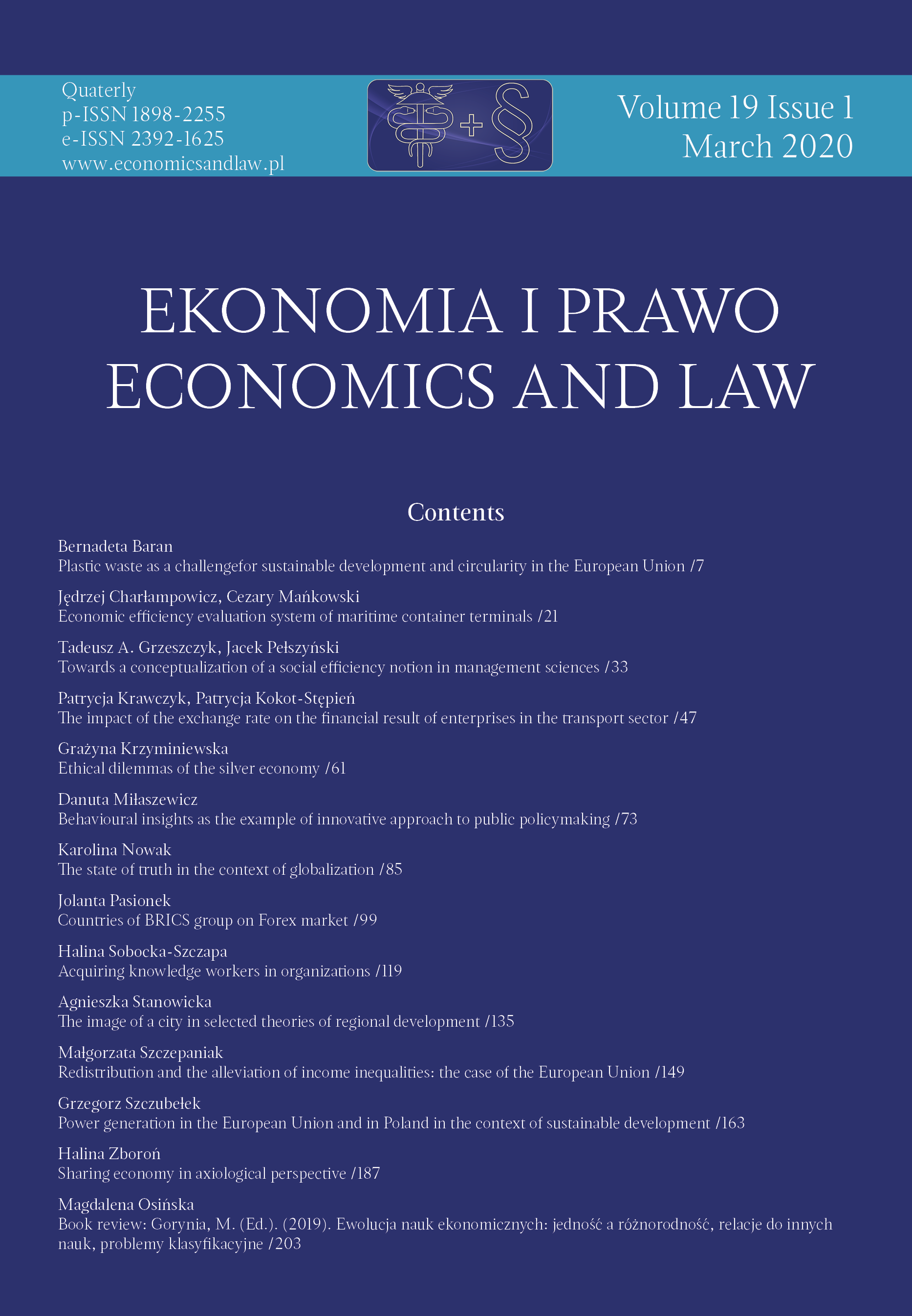Behavioural insights as the example of innovative approach to public policymaking
DOI:
https://doi.org/10.12775/EiP.2020.006Keywords
behavioural insight, public innovation, public policyAbstract
Motivation: Among the theorists and practitioners of public policy is growing awareness of the need to change the assumptions of designing and implementing public policy. The findings of social sciences, especially behavioural economics and experiments used within it, provide knowledge on how within public policy to influence the way people think and make decisions. Using behavioural insights in public policy is innovative opportunity to significantly increase the effectiveness of many public activities.
Aim: The purpose of this article is to analyse behavioural insights as an innovative approach to public policy making and the current strategies for the policy and design of public regulations based on them.
Results: Based on the literature on the subject and the analysis of the experience of nudge units, the principles of introducing behavioural insights as an innovative approach in public policy were indicated. They are currently being refined and recommended as ready-to-apply strategies for behavioural changes.
References
Ciriolo, E. (2011). Behavioural economics in the European Commission: past, present and future. Retrieved 02.04.2019 from https://www.oxera.com.
Dolan, P. (2013). Influencing the financial behaviour of individuals: the mindspace way. In A. Oliver (Ed.), Behavioural public policy. Cambridge: Cambridge University Press.
Dolan, P., Hallsworth, M., Halpern, D., King, D., & Vlaev, I. (2010). Mindspace: influencing behaviour through public policy. Retrieved 02.04.2019 from https://www.instituteforgovernment.org.uk.
Dolan, P., Hallsworth, M., Halpern, D., King, D., Metcalfe, R., & Vlaev, I. (2012). Influencing behavior: the mindspace way. Journal of Economic Psychology, 33(1). doi:10.1016/j.joep.2011.10.009.
European Commission. (2017). Quality of public administration: a toolbox for practitioners. doi:10.2767/483489.
Foley, B. & Griffiths, S. (2011). Engaging behaviour: behavioural economics and citizen engagement. Retrieved 02.04.2019 from https://research.gold.ac.uk.
French, R.D. (2019). Is it time to give up on evidence-based policy? Four answers. Policy & Politics, 47(1). doi:10.1332/030557318X15333033508220.
Gordon, W. (2011). Behavioural economics and qualitative research: a marriage made in heaven? International Journal of Market Research, 53(2). doi:10.2501/ijmr-53-2-171-186.
Halpern, D. (2015). Inside the nudge unit. how small changes can make a big difference. London: WH Allen.
Haynes, L., Service, O., Goldacre, B., & Torgerson, D. (2012). Test, learn, adapt: developing public policy with randomised controlled trials. Retrieved 12.05.2019 from https://gov.uk.
Head, B.W. (2010). Reconsidering evidence-based policy: key issues and challenges. Policy and Society, 29(2). doi:10.1016/j.polsoc.2010.03.001.
Head, B.W. (2016). Toward more ‘evidence-informed’ policy making? Public Administration Review, 76(3). doi:10.1111/puar.12475.
John, P. (2018). How far to nugde? Assessing behavioral public policy. Northampton: Edward Elgar. doi:10.4337/9781786430557.
John, P., Cotterill, S., Richardson, L., Moseley, A., Smith, G., Stoker, G., & Wales, C. (2011). Nudge, nudge, think, think: using experiments to change civic behavior. London–New York: Bloomsbury Academic.
Jones, R., Pykett, J., & Whitehead, M. (2013). Changing behaviours: on the rise of the psychological state. Cheltenham: Edward Elgar.
Kuehnhanss, C.R. (2019). The challenges of behavioural insights for effective policy design. Policy and Society, 38(1). doi:10.1080/14494035.2018.1511188.
Lourenco, J.S., Ciriolo, E., Almeida, S.R., & Troussard ,X. (2016). Behavioural insights applied to policy: European report 2016. doi:10.2760/903938.
Makki, F. (2017). Nudge units are just the tool for effective policy. Retrieved 15.05.2019 from http://www.thenational.ae.
Miller, J.E., Amit, E., & Posten, A.-Ch. (2015). Behavioral Economics. In H. Ten Have (Ed.), Encyclopedia of global bioethics. Jersey: Foster Academic.
Newman, J. (2017). Deconstructing the debate over evidence-based policy. Critical Policy Studies, 11(2). doi:10.1080/19460171.2016.1224724.
OECD. (2017a). Behavioural insights and public policy: lessons from around the world. doi:10.1787/9789264270480-en.
OECD. (2017b). Government at a glance 2017. doi:10.1787/gov_glance-2017-en.
Olejniczak, K., & Śliwowski, P. (2015). Towards behaviorally informed public interventions. Management and Business Administration: Central Europe, 23(2). doi:10.7206/mba.ce.2084-3356.142.
Parkhurst, J. (2017). The politics of evidence: from evidence-based policy to the good governance of evidence. Abingdon: Routledge.
Pykett, J., Howell, R., Lilley, R., Jones, R., & Whitehead, M. (2017). Governing mindfully: shaping policy makers’ emotional engagements with behaviour change. In E. Jupp, J. Pykett, & F.M. Smith (Eds.), Emotional states: sites and spaces of affective governance. London–New York: Routledge.
Service, O., Hallsworth, M., Halpern, D., Algate F., Gallagher, R., Nguyen,… Kirkma, E. (2014). EAST: four simple ways to apply behavioural insights. Retrieved 18.05.2019 from http://www.behaviouralinsights.co.uk.
Simon, H.A. (1997). Administrative behaviour: a study of decision-making processes in administrative organizations. New York: Free Press.
Sunstein, C.R., & Thaler, R.H. (2003). Libertarian paternalism is not an oxymoron. The University of Chicago Law Review, 70(4). doi:10.2139/ssrn.405940.
Thaler, R.H. (2015). Misbehaving: the making of behavioral economics. New York: W.W. Norton.
Thaler, R.H., & Sunstein, C.R. (2003). Libertarian paternalism. American Economic Review, 93(2). doi:10.1257/000282803321947001.
Thaler, R.H., Sunstein, C.R. (2008). Nudge: improving decisions about health, wealth and happiness. New Haven: Yale University Press.
Thaler, R.H., Sunstein, C.R., & Balz, J. (2012). Choice architecture. In E. Shafir (Ed.), The behavioral foundations of public policy. Princeton: Princeton University Press.
Downloads
Published
How to Cite
Issue
Section
Stats
Number of views and downloads: 778
Number of citations: 0
